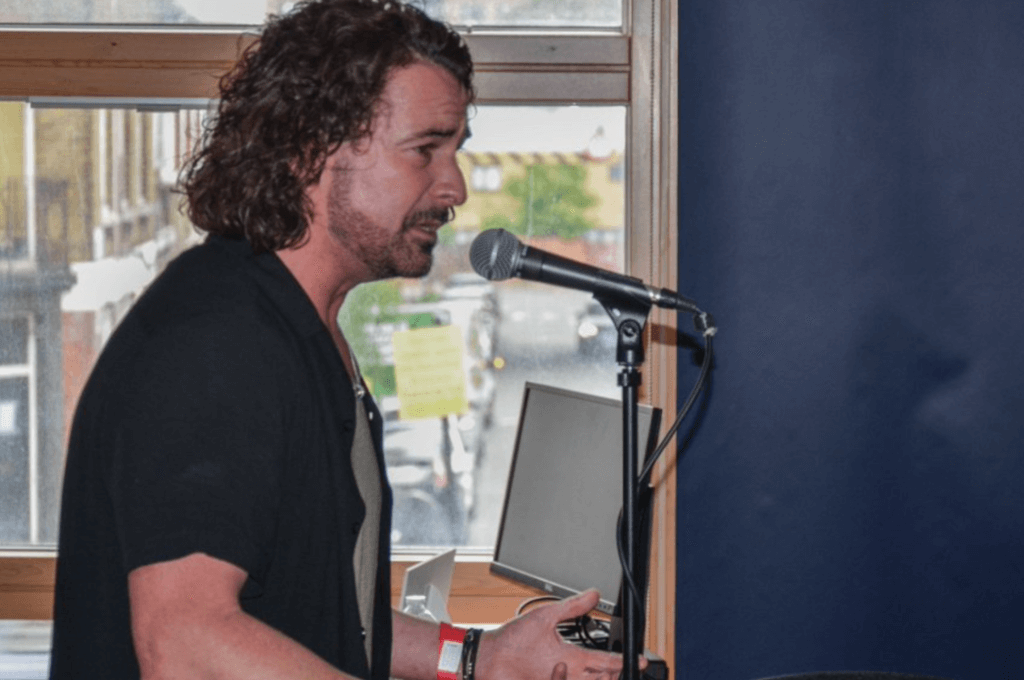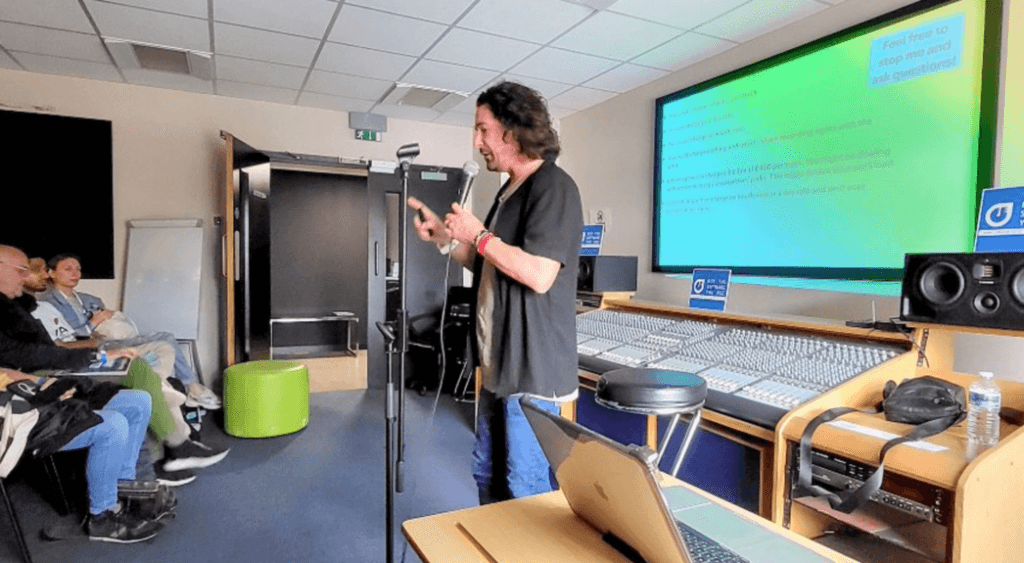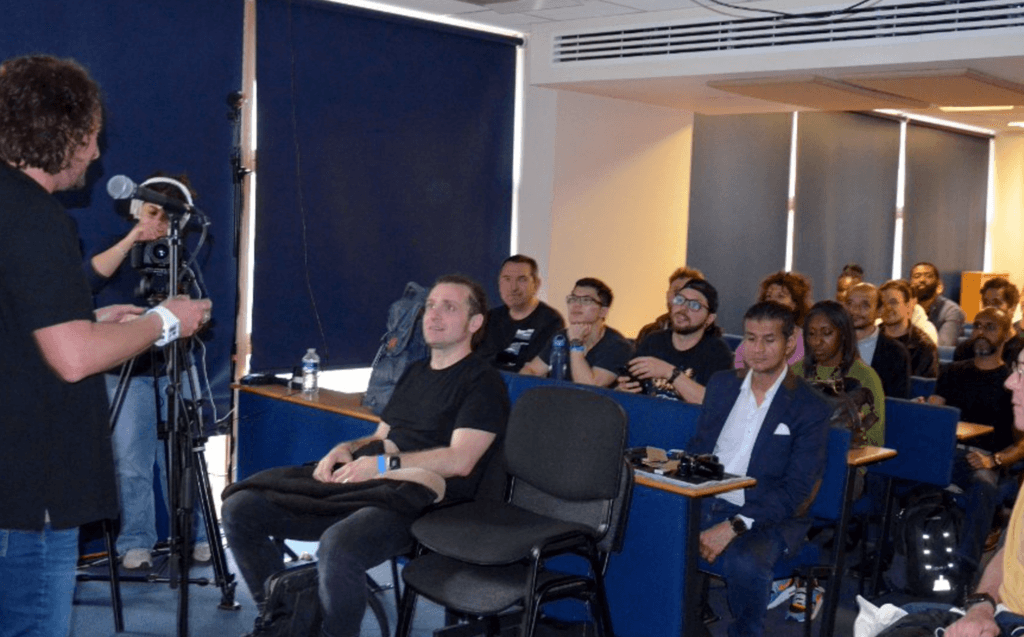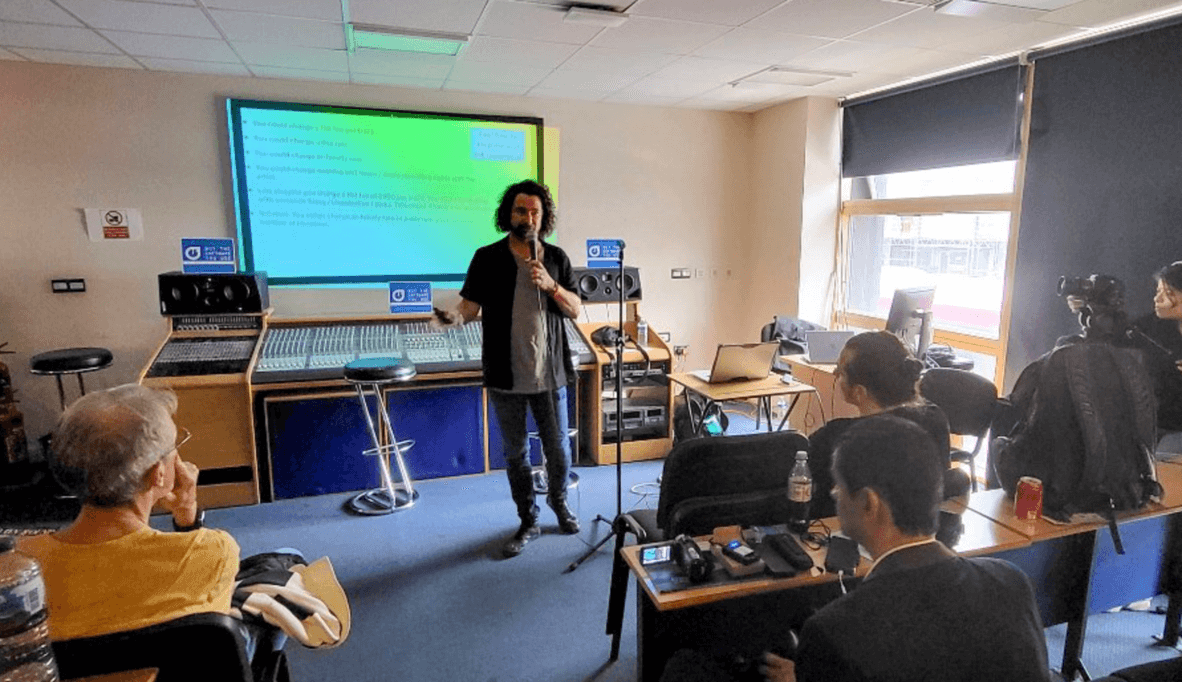SAE was delighted to host IMSTA FESTA 2024 at our London campus.
Acclaimed songwriter and music producer Jonny Amos was among the guests who shared his expert industry knowledge with attendees and explored the various income streams available for music producers.
Jonny Amos is a UK-based songwriter with chart success in Europe and Asia and a producer with credits on a variety of independent and major labels.
Here, we delve into his essential advice for music producers looking to monetise their musical creations. If you’re interested in learning more about our Audio Production courses, then get in touch with our team now.
Figure out how long it takes to complete projects
If you complete a music production project over 10 hours and it’s £35 p/h, that’s £350 – this is obviously basic maths. However, if you still need to run comps and edits, then this is extra time – don’t give this away for free.
Work out how long it takes you to do something, what you can charge and stay on top of this.
Act as a talent scout to work with emerging talent
As producers and artists, it’s good to be a talent scout, to know emerging talent and who is coming up and doing well.
However you do it – searching out artists either online or going to live gigs – making connections is a positive thing to do. You could end up in a position where you co-own a copyright on a piece of music which could result in a sync or with a new artist who lands a record deal.

Be clear on your songwriting splits and copyright
Always remember at the start of a project or collaboration to have a conversation about how you will split the work. Get this in writing as it means nothing if it’s not written down.
Every song has two copyrights, one for the song and one for the recording. You need to discuss and decide what is being split and how you’re going to do this.
The conversation begins with an awareness of what this means. If an artist comes to a producer, and says let’s work together and do a clean split – this means let’s split the recording and the song. If you don’t know what this means, then query it.
As soon as you sign a track with a sync agent, they will need everything cleared. You can’t do anything with it until the splits and lines of ownership are clear.
Do speculative work – if it feels right
Many producers are sent music by new artists. In some cases the request will come into help them define their sound. You could do one or two songs – and this might lead to further paid work. There is value in adopting this approach but you need to balance what you will do for free now with what might happen in the future.
Use unwanted tracks in your sample packs
Sample packs are collections of audio samples and loops that music producers can use in their own productions.
As a producer, you can create these from pieces of music or loops that you didn’t use elsewhere. It means nothing goes to waste. I’ve sold a lot of sample packs, and been shocked at how many things people have wanted that I would throw away.
Stay on top of trends and styles
Consider the songs and sounds in fashion and your specialism – sample pack labels and websites often follow the latest trends in terms of musical style. Create artwork and a two-minute audio advert showcasing what is inside the pack. You can then market yourself or pitch to a sample library like Splice.

Sample libraries can be another income generator
Sample libraries are collections of sampled sounds presented in a playable format inside a sampler.
Multi-samplers are available in DAWs such as Ableton but there are also third party options including Kontakt.
Perhaps you have some old toys in the loft that could be sampled and turned into a playable instrument. Perhaps you know a busker with a certain timbre or a vocalist willing to record their voice for a sample instrument. There could be a rare instrument in a niche music shop that you could sample and digitise.
Consider sound design in the preset market for opportunities
The ability to work inside one specific software synth and build unique sounds can be useful for others too.
Much like the previous examples, there is an expanding need for presets in soft synths with hybrid styles and genres. Anyone who can move quickly, see what genres are trending and get that sound ready can be early to market. If you have the skills to build sounds from scratch, perhaps you can tailor your creativity to build sounds for other producers to use inside their synth engine.

Create production music to go with visual content
Production music is often referred to as Library music and is a form of recorded music that can be licensed for TV and film.
Find your niche, what’s your lane, what’s your thing. You want people to know that you’re the person for a particular sound – whether it be dark electronica or trippy ambient sounds.
Concept-led album projects can be pitched and signed by Production music libraries so that they can be licensed for visual projects.
Many broadcasters and production companies have blanket licences in place with PRS and MCPS so licensing this music is simple and easy.
There are more opportunities for producers than ever before
There are perhaps less commercial studios there but there is more work than before as we’re in the golden era of remote music production.
Fiverr and Airgigs can be a great way to increase your workload. Create a clear and realistic offer and be reliable, organised and responsive – those that state their specialism and niche tend to get the most work.
Visit jonnyamos.com for more.
Study Audio production at SAE
At SAE, our Audio Production Degree can help students learn the latest production skills and techniques to further their careers.
Our course encourages students to adopt a future-facing mindset where they are keen to understand more about how innovation and technology will shape the industry and their work.
Get in touch with our team to find out more.
Photo credits: IMSTA team

































